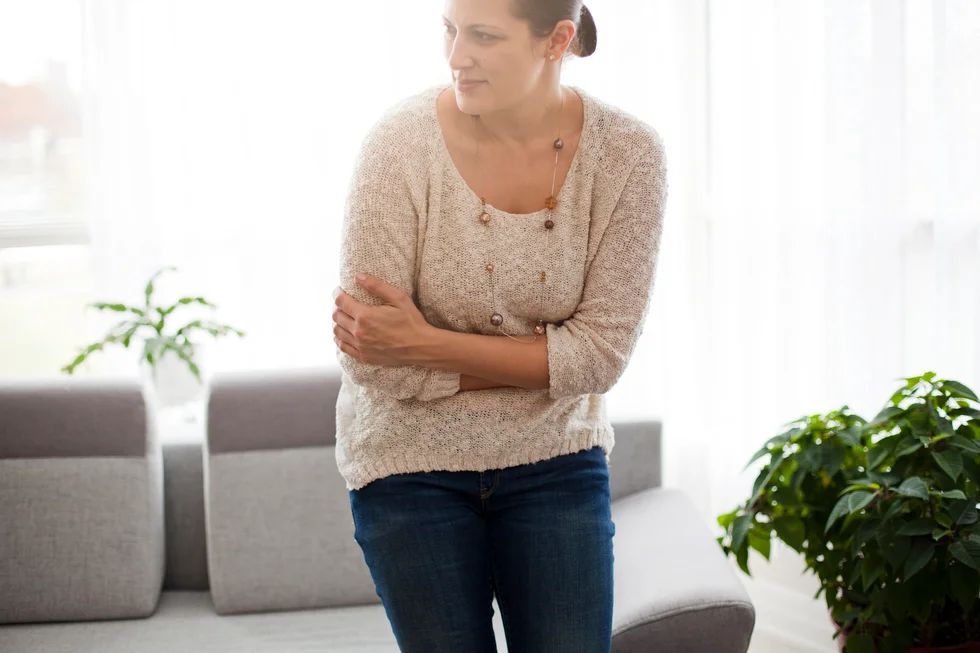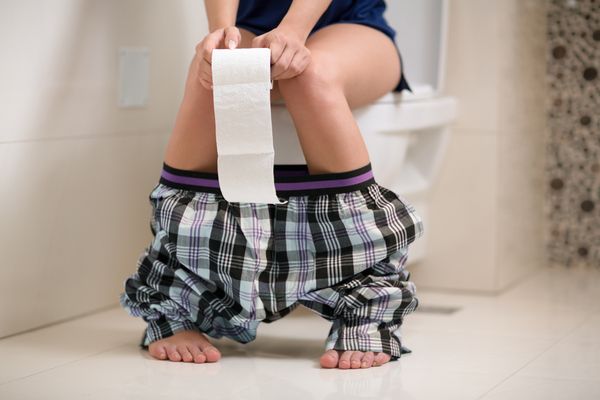If you find yourself pushing too hard, stopped up, clogged, unable to go (or whatever you like to call it), it may be a by-product of menopause. When going gets tough, the tough can't always get going.
I think it's constipation, but I'm not sure. What is the definition, exactly?
Constipation is defined as having fewer than three bowel movements a week; having hard, dry stools; feeling as if you haven't completely eliminated and/or doing a lot of straining when you try to go.
So, what is it about menopause and not being able to go?
Constipation becomes increasingly common around menopause. And, in general, it's more of a woman's problem than a man's (in case you hadn't noticed).
Has anyone mentioned hormones?
Well, yes. The connection begins to make sense when you consider that constipation is more common during pregnancy, during your menstrual cycle, and then again, during menopause. What they all have in common is hormones. The alterations of estrogen may be responsible, according to research, which finds that "ovarian hormones influence gastrointestinal function because estrogen receptors have been found in the gastric and small intestinal mucosa."
Translate, please?
Female hormones can affect a lot of things—we already know that. They can latch onto receptors in your gut and, hence, affect your digestive tract, causing your colon to slow down. Voila: constipation.
Other things that might mess with your regularity include diabetes, an overactive parathyroid gland, pregnancy or an underactive thyroid. Find out about 5 Surprising Constipation Triggers.
So, now what?
The good news is that it's not hopeless; you have some control over it. Paying attention to things like diet, exercise and everyday habits could make a big difference. Learn more about How to Deal With Constipation.
Let's talk about diet.
Certain foods can cause constipation. For many people, it can be cheese, high-fat meats, dairy products and eggs. Rich desserts and gooey, sugary sweets can plug you up as well.
Also pay attention to fiber: Many of us aren't getting enough of it. You need fiber to bulk up your stools so they can pass more easily through your intestines. It's recommended that women 50 and older get at least 21 grams each day. (Consider that the average American consumes only about 13 grams a day, and you can figure out why lots of people are constipated.) You need both soluble fiber (which draws water into your stools) and insoluble fiber (which adds bulk to your stools) to prevent constipation.
Let's talk specifics.
Especially high in fiber (as well as a ton of healthy nutrients) are something called "pulses," which are beans, lentils, chickpeas and peas.
Prunes (and prune juice), as we all know, are associated with helping constipation. Dried fruits like apricots and figs are also high in fiber. Also valuable are wheat bran, broccoli, apples, grapes, pears and kiwis.
And you can't go wrong with whole wheat breads, cereals and pastas, as well as olive and flaxseed oils.
Don't forget to drink plenty of water. Dehydration is the cause of constipation in many cases. Water is important, because it helps add that essential hydration to your stools.
What other lifestyle things should I look into?
Posture. There's research to show that tweaking it can help, because it changes the angle of things, allowing your pelvic floor to relax, allowing waste to pass more easily. Think the posture of Rodin's famous sculpture, "The Thinker." That is, sitting leaning forward while resting your elbows on your knees. You can also achieve something similar by placing your feet directly in front of you onto a small step-stool. That puts your body at that all-important 90-degree angle.
Coffee. Can't go until that morning cup? That's because caffeine doesn't just wake up your brain, it stimulates the contractions of the muscles in your gastrointestinal tract. However, it's not always about the coffee itself, but more about the habit: Drinking or eating anything first thing in the morning can helps jump-start your gastrocolic reflex (meaning, it starts a series of tummy contractions to get things moving).
What if my diet is already good, and I get enough exercise? What else could be getting in the way of my movements?
Don't hold back the urge to poop. Granted it may not always be convenient or desirable, but holding it in for too long can backfire and make you not go at all. If you can, try to create a regular schedule of bathroom visits.
Check your meds. Some medications can cause constipation. Among these are drugs that treat depression and antacids that contain aluminum or calcium. Certain allergy medications (antihistamines) and painkillers can do it, along with drugs used to treat high blood pressure and Parkinson's disease. Add to the list sedatives, diuretics, iron supplements and anti-inflammatories.
There are also certain medical conditions that might contribute to constipation, like stroke, diabetes, irritable bowel syndrome or an intestinal blockage.
Use laxatives cautiously. They can be helpful, yes. But they can be overused and actually backfire. If you use them too often, your body may become dependent on them and stop being able to function on its own by decreasing your colon's ability to contract.
Kinder, gentler natural laxatives you might want to consider include castor oil, senna tea, aloe vera and magnesium citrate supplements or those that contain psyllium or methylcellulose, such as Metamucil or Citrucel.
So, when should I see a health care professional about my problem?
Contact your health care professional if:
- You have a sudden change in your bowel movements
- There's blood in your stool
- You have severe stomach pain
- You're losing weight without trying
- All other anti-constipation measures fail







